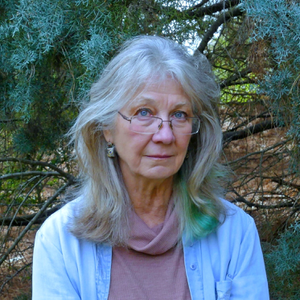
Arleen Bessette
Host Mycologist & Keynote SpeakerArleen Bessette is a retired psychotherapist, as well as a mycologist and botanical photographer. She has been collecting and studying wild mushrooms for more than forty years. A member of the North American Mycological Association, the Asheville Mushroom Club and The Gulf South Mycological Society, she has published several papers in the field of mycology and has authored or coauthored more than fifteen books including: Boletes of Eastern North America, The Rainbow Beneath My Feet: A Mushroom Dyer’s Field Guide, Polypores and Similar Fungi of Eastern and Central North America, and the forthcoming A Field Guide to the Mushrooms of Georgia. Arleen has won several awards in the North American Mycological Association’s annual photography competition, including top honors in both the documentary and the pictorial divisions. Her mycological interests include dyeing fiber with fungi, mycophagy, and the interplay between fungi and consciousness.
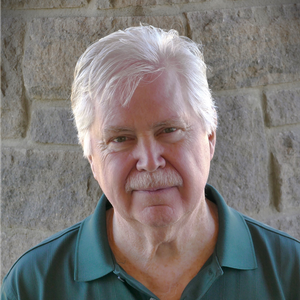
Alan E. Bessette, Ph.D.
Emeritus professor of biology at Utica College of Syracuse UniversityAlan E. Bessette, Ph.D., is a professional mycologist and distinguished emeritus professor of biology at Utica College of Syracuse University. A member of the North American Mycological Society, the Asheville Mushroom Club and the Gulf South Mycological Society, he has published numerous papers in the field of mycology and has authored or coauthored more than twenty-five books including: Edible Wild Mushrooms of North America, Mushrooms of the Southeastern United States, A Field Guide to the Mushrooms of the Carolinas, and most recently Polypores and Similar Fungi of Eastern and Central North America. Alan served both as a consultant for the New York State Poison Control Center and as the scientific adviser to the Mid-York Mycological Society for more than twenty years. He has been the principal mycologist at national and regional forays and was the recipient of both the 1987 Mycological Foray Service Award and the 1992 North American Mycological Association Award for Contributions to Amateur Mycology.
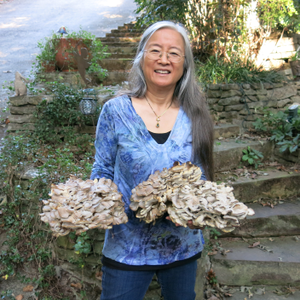
Dr. Cornelia Cho
President at Mushroom Club of GeorgiaCornelia Cho, M.D. is a practicing board-certified pediatrician, Mushroom Club of Georgia president, citizen-scientist and artist. In addition to pediatric emergency room experience and a pharmacology fellowship, she has trained in Mind/Body & Brain science, drug-free therapies for treating trauma, and wilderness medicine preparedness. Her Korean heritage gave her a head start on a pro- and prebiotic-rich diet along with early experience collecting wild foods. She loves growing, preserving, fermenting, foraging, cooking and eating good food, as well as finding waste solutions, learning and teaching about regenerative agriculture, reclaiming traditional foodways and advocating for food justice. She has been a previous presenter at NAMA and to numerous mycological societies across the US. She gave a recent keynote at the Midwest Women's Herbal conferences, where she is also a regular featured presenter, as well as presenting regularly at Mycelium Mysteries and the Wild Health Summit. She has particularly enjoyed teaching at John C. Campbell Folk School alongside her husband of 23 years, Sam Landes.
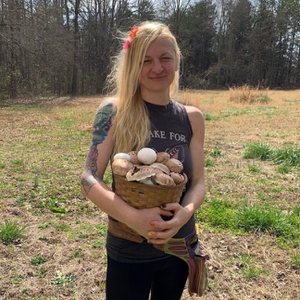
Olga Katic
Owner at Mushroom MountainI grew up mushroom hunting with my relatives in Bosnia and Hercegovina. When our parents were at work, our grandma watched my sister and I and we had the freedom of being in the woods all day long. At one moment we would be digging up leeches out of the fresh water well and feeding them to chickens, and the next moment, we would get chased by grandma’s rooster. But we also spent a lot of time picking boletes, milkies, and other varieties of mushrooms. We’d bring them to grandpa, and he would get rid of the ones he thought were not edible, the rest we would cook on the wood stove and eat them.
Skip to now. I am the proud owner of Mushroom Mountain and have an amazing team working with me. We produce mushroom spawn for many different edible and medicinal varieties. We also make several different medicinal mushroom extracts and medicinal mushroom honeys under the name Mycomatrix. Mushroom Mountain also runs a Wild Mushroom Food Safety Certification Program. This program was accepted by Health Departments of 7 states and counting, as well as being endorsed by the FDA.
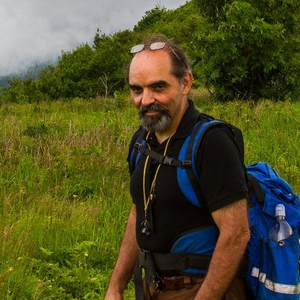
Gary Kauffman
Program Manager at US Forest Service in NCGary Kauffman is the botanist/ecologist for the Forest Plan. He has worked with the National Forests in North Carolina since 1992, serving as the botanist for the Nantahala National Forest before taking the position as Forest Botanical Products Specialist. Since 2002, he has coordinated the invasive plant program for the state’s four forests. Gary has a MS from Ohio University specializing in botany and Acrasiomycetes (slime molds).
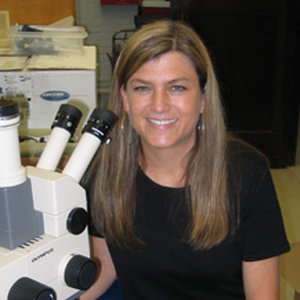
Julia Kerrigan
Professor of Mycology at Clemson UniversityJulia Kerrigan is an Associate Professor of Mycology in the Department of Plant and Environmental Sciences at Clemson University in South Carolina. The underlying theme in her research is elucidating the basic biology of fungi and their interactions with other organisms. She teaches Introductory Mycology and Mycology Practicum, as well as Fungi and Civilization. Julia is a co-founder and President of the South Carolina Upstate Mycological Society (SCUMS). She is also the current President of the Mycological Society of America.
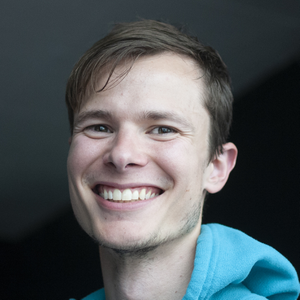
Ben Lemmond
Ph.D. Candidate at University of FloridaBen Lemmond is a Ph.D. Candidate at the University of Florida in Dr. Matthew Smith's lab. Ben's research focuses on biodiversity and ecology of truffle fungi and their relatives, especially ascomycete truffles in the order Pezizales.
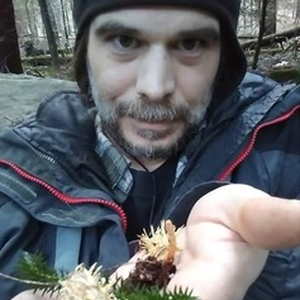
Jeff Manganaro
Owner at Appalachiangold FungiCordyceps hunter and breeder working to develop methods to use these fungi in ways that are mutually beneficial to people fungi and the environment
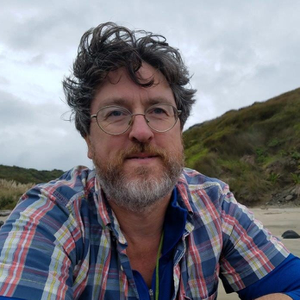
Dr. Brandon Matheny
Professor and Chair of Graduate Affairs at University of TennesseeBrandon is a professor at the University of Tennesse in the Department of Ecology and Evolutionary Biology. He is a fungal biologist with a research and teaching focus on systematics and ecology of mushroom-forming fungi. Brandon was a history undergrad at Oklahoma State, received his PhD in Botany at the University of Washington, did a five-year postdoc at Clark University working on the fungal tree of life, and has been a professor at Tennessee since 2008. He is currently working on a systematic revision of the mushroom family Inocybaceae in North America and a floristic treatment of mushrooms in the southern Appalachians.
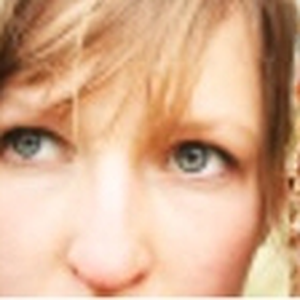
Karen Milnes
Owner at Cabin CrittersKaren has a studio art degree from the University of Virginia with a concentration in printmaking. Cabin Critter Designs is her print shop and studio in the Highlands of Virginia, specializing in logo design, functional art and home décor. Often inspired by her surroundings, her work trends towards natural subjects and colors and spans many mediums, but she is always willing to try something new.
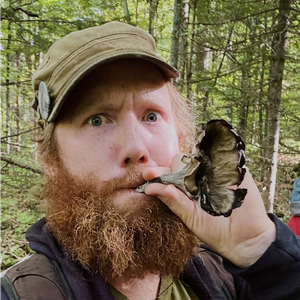
Pat Mitchell
Cofounder & President of Blue Ridge Mycological SocietyPat Mitchell, like many of us, is a self-taught amateur mycologist. Originally from a suburb outside of Chicago, he now lives with his wife and three children in central Virginia where, in 2018, he became the cofounder and president of the Blue Ridge Mycological Society. Mitchell also works with the Lynchburg Parks & Rec. as the Mycology Communicator, teaching basic mycology courses, for residents and nonresidents of Lynchburg.
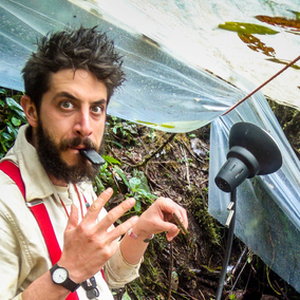
Danny Newman
Danny Newman is an independent parataxonomist and photographer interested primarily in the systematics of Andean-Amazonian fungi. In addition to several self-directed biodiversity inventorying initiatives, Newman has provided research assistance to graduate students of San Francisco State University, SUNY College of Environmental Science and Forestry, and the University of Oregon, encompassing a combined 13 countries across five continents. Formerly a curatorial intern at the Cornell Plant Pathology Herbarium in Ithaca, New York, and librarian to the Mycological Society of San Francisco, he currently resides in northern New Mexico. Newman's photography can be found on Instagram (@kallampero), with detailed observations on the citizen science platform, iNaturalist (@myxomop).
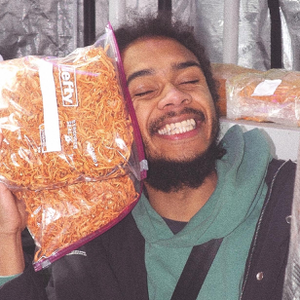
William Padilla-Brown
Founder, CEO & Chief Scientist of MycosymbioticsFounder of MycoSymbiotics, William Padilla-Brown is a Multidisciplinary Citizen Scientist practicing social science, mycology, phycology, molecular biology, and additive manufacturing. William is passionate about the myriad uses of cannabis, especially its psychoactive resin. William is constantly in the mix of Contemporary Ritual in a nuanced modern Urban Shamanism, spending his time vlogging for social media, writing, contributing for Fungi mag, researching, rapping, singing, and loving his Beautiful Lady Lydia their son Leo, and daughter Xara. William holds Permaculture Design Certificates acquired through Susquehanna Permaculture and NGOZI, and a Certificate from the Bigelow Laboratory for Ocean Sciences for completing their Algal Culturing Techniques Course. William wrote the first books in English on Cordyceps cultivation. William regularly teaches k-12 classes around the United States, for universities including Cornell’s Small Farms Program, private clubs, and events, as well as offers private consultations. In 2021 William’s research has been sponsored by MUDwtr, and affiliated with Mydecine, Oxford Nanopore, MiniPCR, ExtractCraft, and OmegaBiotek. William and his work have been featured on Fantastic Fungi, VICE, Buzzfeed, The Verge, Outside Magazine, Civil Eats, Public Goods, The Book “One Earth” , and much more.
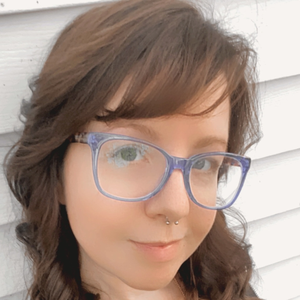
Mandie Quark
Mandie Quark, the self-proclaimed Mushroom Madman, walked barefoot to receive her Bachelor’s in Chemistry from a tiny eclectic Honors College situated on a historic Maryland river in 2007. She spent the first part of her career studying molecular biology in academia, meanwhile culturing a healthy fascination with mycology on the side. For more than a decade she worked as a biomedical research scientist in Philadelphia at a Top-100 Hospital. There, while earning her Masters degree in Biochemistry from the University of the Sciences, she preformed high throughput screening in a chemical genomics lab. Mandie made the decision to hang up her academic lab coat in 2018 to pursue an alternative career path - including taking macro photos of mushrooms and explaining the mysteries and complexities of molecular mycology to the public. She has been a featured guest on many podcasts. Her series of advanced classes for mycologists were well received by the community. In 2023 Mandie started several new collaborations and is extremely excited about what her future in fungi will hold.
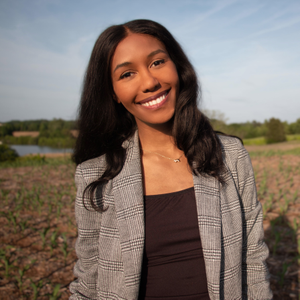
Jasmine Richardson
Jasmine Richardson is a professional microscopist and third-generation farmer. Her father planted the idea of growing truffles in her mind in 2014, and she later established a Tuber melanosporum orchard on her family farm in Virginia in 2021. She plans to establish an additional truffle orchard on another farm in North Carolina.
When she is not tending to the daily needs of her 70 acres of farmland, Jasmine hosts workshops and talks on truffle cultivation, microscopy, and conventional mushroom growing. She independently studies truffle cultivation through hands-on training and microscopical analysis; she has completed educational coursework in Europe and North American institutions. She is the former vice president and treasurer of the San Francisco Microscopical Society.
American truffle growers face many challenges and lag far behind commercially successful orchards in Europe and Australia. Jasmine is currently focused on how more accessible microscopical descriptions and images of ectomycorrhizal morphologies combined with DNA analysis can materially assist today’s truffle tree nurseries and orchards. She views collaboration, potential regulation, and increased competition amongst tree suppliers as decisive for the future of American truffle growers.
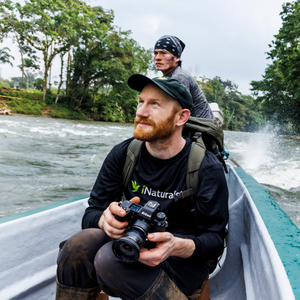
Alan Rockefeller
Co-Owner at Mycena, LLC.Alan Rockefeller is an expert mycologist in high demand at mushroom events where he teaches workshops on DNA barcoding, field photography, and fungal microscopy. In 2022 alone, Alan traveled the continent in synchrony with the mushroom seasons, and spoke at over 50 events in the span of a single year. Committed to his cause, Alan has been studying fungal diversity for more than two decades, and since 2001 he has photographed more than 2,500 species of fungi. In order to discover new fungi, and spark interest in the hearts and minds of those new to the field, Alan regularly leads forays all over North America, including Mexico where he has been studying the mushroom diversity for 15 years and is consequently bilingual. This March Alan conducted field work in the Amazon rainforest in Ecuador where he sparked collaborations with several field researchers and even helped the national herbarium identify their accessioned specimens. Alan’s contributions to community science have been widespread, and his dedication to teaching thousands of people over several years how to extract and amplify the DNA of their mushroom finds for sequencing is remarkable, and remains unparalleled. Eventually Alan hopes to be able to offer free barcoding services to the mycology community via his newest endeavor into Nanopore sequencing. As of today, Alan has uploaded more than 700 of his own fungal DNA sequences to Genbank, and he is a co-author on several scientific papers, including publications documenting new species of bioluminescent Mycena and Psilocybe. Alan is also devoted to the art of macroscopic mushroom identification and legitimately spends hours each day identifying mushrooms for the general public. Amazingly, he has identified over 250,000 fungi on websites like iNaturalist, Mushroom Observer, and various Facebook Groups. Nothing short of a powerhouse, Alan Rockefeller is an authority on the leading edge of mycology, who is beloved by his community for the knowledge and value he contributes to the field.
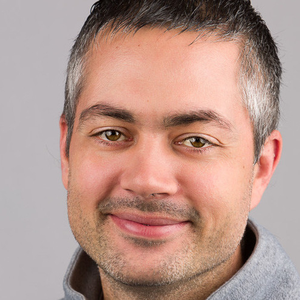
Stephen Russell
President at Hoosier Mushroom SocietyStephen Russell is a mycologist from Indiana working on a biodiversity survey of all the macrofungi (mushrooms) that occur in the state. He founded The Hoosier Mushroom Society in 2009 and is currently the President of the organization. His initial interest in mushrooms began with cultivation, which led to writing a book titled The Essential Guide to Cultivating Mushrooms (Storey Publishing, 2014). He has chaired the NAMA Mycoflora Committee and was a co-founder of the North American Mycoflora Project. Stephen’s current project is a citizen science and DNA based exploration of continental macrofungal biodiversity, which has now generated tens of thousands of new DNA-sequenced collections of fungal collections.
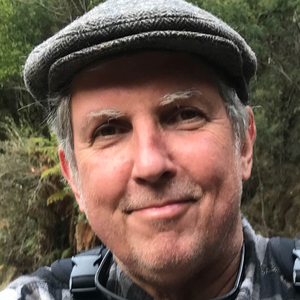
Rytas Vilgalys
Professor, Biology Department at Duke UniversityRytas Vilgalys’ lab at Duke University studies natural history of fungi, including their genetics, ecology and evolution. Together with his lab group, Vilgalys has published over 200 scientific articles, with over 28,000 citations. Their current research program employs genome sequencing and metagenomics to 1) identify communities of fungi associated with forest trees, including pines, poplars, and eucalypts; 2) investigate molecular functioning of fungal communities with their tree hosts using multi 'omics tools.These studies have broad relevance for understanding genetics of plant-fungal interactions (symbiosis), microbial ecology of forest ecosystems, and invasive biology of introduced species.
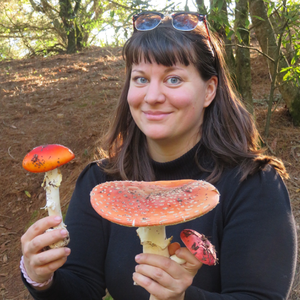
Dr. Kristen Wickert
@KaydubsthehikingscientistOver the past eight years Dr. Kristen Wickert has utilized the social media app Instagram to educate the general public on the natural world around them. The posts to her personal Instagram account, with the username @KaydubsTheHikingScientist, include information about organisms and conservation efforts to expose the public to the world around them, especially in the wild and wonderful world of Appalachia. She focuses on the core concept that we can all contribute to caring for our ecosystem in our own backyards by avoiding planting exotic or invasive species and instead reintroducing native plant species that allow our landscapes to be habitat for native fauna and fungi. Her educational background includes a bachelor’s in Forest Biology and a master’s and PhD in Plant Pathology. Her master’s work focused on endophytic and plant pathogenic fungi in Eastern hemlock needles and their ability to act as facultative entomopathogens against the devastating insect, hemlock woolly adelgid. During her PhD she researched plant pathogenic fungi in controlling the invasive tree-of-heaven. Photo by Damon Tighe